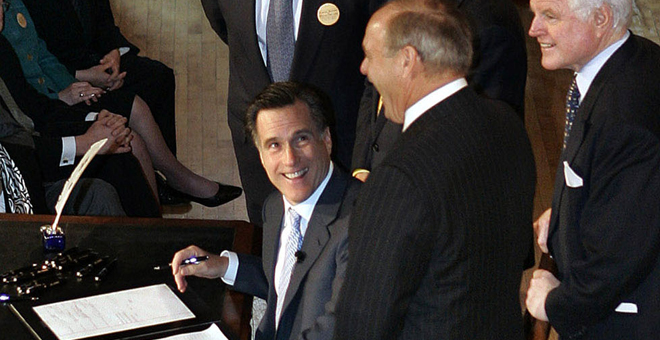Mitt Romney’s support for an individual mandate as part of his signature health care legislation in 2006 has never been in doubt. But emails unearthed between then Massachusetts Governor Romney and top staffers reveal how close he was to the crafting of “Romneycare” and provide details on how he persuaded a skeptical Democratic legislature to adopt the provision.
The emails, obtained by the Wall Street Journal, reveal a politically savvy governor and his team seeking to maneuver a complex bill through the Massachusetts legislature. The bill became the template for President Obama’s national health care law, which Romney promises to repeal if elected president.
For team Romney, it was clear from the start that a mandate would be critical.
Analyzing a proposal offered by the Senate leader, Romney’s health secretary Tim Murphy wrote in a Feb. 2006 email to the governor and key aides: “It is unclear that the plan adopts an individual mandate. We must have an individual mandate for any plan to work.”
In a confidential slide slow presentation dated Feb. 16, 2006 by Romney’s team for Democratic leadership, the requirement that all state residents purchase insurance was pitched under the umbrella of “individual responsibility” and dubbed a “free rider surcharge.”
After Romney met with State Senate President Robert Travaglini (D), he expressed confidence to his top aides. “Spoke with Trav this AM. He isn’t ready to sign on to the deal as yet but I am confident a deal can be struck,” Romney wrote, adding: “Important: we are NOT to tell anyone where he is on these: he will have to make his own trades down the road perhaps.”
One week later, the plan was coming together, but the mandate remained a sticking point.
“The rub will be the individual mandate and risk pools,” Murphy wrote to the team. Conceding that it ultimately sits in the hands of the Democratic legislature, he added: “Unfortunately, we don’t control our future. If Sal and/or Trav want to be obstinate, then we will be trouble.” (He was referring to Travaglini and House Speaker Salvatore DiMasi (D).)
Two days later, Romney caught his break. A Boston Globe reporter, reaching out to the governor’s office for comment, tipped them that the mandate was on its way.
The reporter wrote, “i’m told the senate will amend its health care bill today to add some kind of individual mandate,” and then asked for a response. Romney’s former — and current — adviser Eric Fehrnstrom forwarded the email to the team.
“I applaud the Senate’s courageous step towards covering every citizen with health insurance,” opened the statement from Romney, first circulated between his aides.
Romney signed the bill into law on April 12, 2006.
Days prior, the governor personally drafted several versions of an op-ed for the Wall Street Journal making the case for the legislation. In the drafts that his aides helped edit, Romney seemed keen on defending the mandate to skeptics on the right, invoking an argument that he has since used and that Obama often uses to defend his mandate.
“Some of my libertarian friends balk at an individual mandate,” Romney wrote in draft language that was edited. “But is it libertarian to insist that government pick up the tab for those without insurance or means to pay? An uninsured libertarian might counter that he could refuse the free care, but under law, that is impossible — and inhumane.”
On the day he signed the bill into law, Romney wrote an email thanking top aide Tom Trimarco.
“Quite a day! You deserve a great deal of credit for making today happen,” Romney wrote. “You have made a huge difference, for me and for hundreds of thousands of people who will have healthier and happier lives. Thanks Tom. Best, Mitt.”










